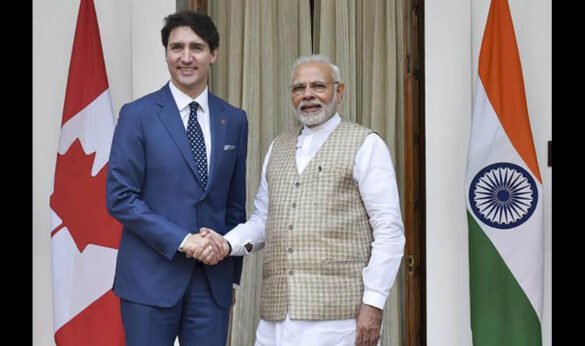Tensions between India and Canada have escalated sharply, as both governments take strict actions over murder accusations linked to the killing of a Sikh separatist leader on Canadian soil. The diplomatic fallout has seen both countries expelling top envoys and several diplomats, deepening a rift that began in 2023 with the assassination of Hardeep Singh Nijjar, a prominent figure in the pro-Khalistan movement.
Background of the Dispute
The row centers on the assassination of Hardeep Singh Nijjar, who was shot dead outside a Sikh temple in Surrey, British Columbia, in June 2023. Nijjar was an outspoken supporter of the Khalistan movement, which advocates for a separate Sikh homeland in India’s Punjab region. India had labeled Nijjar a terrorist, accusing him of leading a militant separatist group, allegations his supporters have rejected as unfounded.
In September 2023, Canadian Prime Minister Justin Trudeau announced that Canadian intelligence had found credible evidence suggesting that Indian agents were involved in Nijjar’s killing, calling it a violation of Canadian sovereignty. India has vehemently denied these accusations, with officials calling them “preposterous” and accusing Trudeau of pandering to Canada’s large Sikh population for political gain.
Diplomatic Expulsions and Accusations
The situation reached a critical point this week as both the Indian and Canadian governments took strict actions over murder accusations, expelling each other’s diplomats. On Monday, India’s foreign ministry issued a statement calling on Canada to withdraw six of its diplomats, including Acting High Commissioner Stewart Ross Wheeler, by October 19. The ministry also announced that it would be withdrawing its top envoy to Canada, High Commissioner Sanjay Kumar Verma, along with other diplomats, citing concerns for their safety.
India expressed outrage over Canada’s allegations, accusing Trudeau’s government of allowing Sikh separatist campaigners to influence the country’s foreign policy. Meanwhile, Canada’s government maintained that it had provided evidence to India regarding Nijjar’s killing and urged India to conduct a thorough investigation into the matter. “It is in the interest of both our countries to get to the bottom of this,” Wheeler said after meeting with Indian officials in Delhi.
Public Safety Concerns in Canada
As the diplomatic crisis unfolded, Canadian police provided more details about ongoing investigations into threats posed by individuals allegedly linked to Indian agents. The Royal Canadian Mounted Police (RCMP) revealed that it had been forced to make public disclosures about these threats due to concerns for public safety. RCMP Commissioner Mike Duheme confirmed that there were over a dozen credible threats targeting members of the pro-Khalistan movement in Canada. “We reached a point where we felt it was imperative to confront the government of India,” Duheme stated, adding that the threats had escalated to a level that warranted immediate action.
Canadian authorities are now grappling with what they describe as a broader pattern of criminal activity attributed to Indian agents, including homicides, extortion, and violent acts directed at pro-Khalistan supporters. These allegations have intensified the diplomatic standoff, prompting both Indian and Canadian governments to take strict actions over murder accusations, despite denials from Indian officials.
Political Ramifications
The diplomatic fallout has strained ties between India and Canada, which had already been under pressure due to previous disagreements. Visa services were suspended, and Canada was asked to withdraw dozens of its diplomatic staff from India. Although India briefly resumed visa processing for Canadian citizens in October 2023, relations between the two countries remain tense.
Canadian Foreign Minister Mélanie Joly recently described the relationship as “tense” and “very difficult.” She also raised concerns about the potential for further violence, warning of the possibility of more killings similar to Nijjar’s on Canadian soil. Joly’s remarks underscore the ongoing challenge of managing relations with India while addressing the security risks posed by tensions within Canada’s Sikh community, which is the largest outside of India.
International Impact and Responses
The diplomatic standoff has drawn international attention, with many observers concerned about the broader implications of the Indian and Canadian governments taking strict actions over murder accusations. The allegations have cast a shadow over both countries’ international reputations, and the escalating dispute could complicate their relationships with other global powers.
India continues to maintain that Canada’s accusations are baseless, while Canada insists that it is acting in defense of its sovereignty. The Confederation of African Football (CAF) has yet to issue any statement related to the issue, but both governments have made it clear that their current priority is ensuring the safety of their citizens and diplomats.
As the situation unfolds, it remains to be seen how the Indian and Canadian governments’ strict actions over murder accusations will affect future diplomatic relations and whether any resolution can be reached through further investigation and dialogue.
Stay connected to know more on arcnews.online for global news like Indian And Canadian Govts Take Strict Actions Over Murder Accusations. For videos updates visit our YouTube. Do subscribe to Arcnews to get latest updates directly in your mail box.
Have A Great Day.


